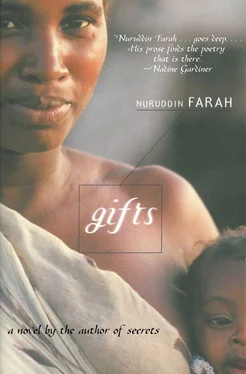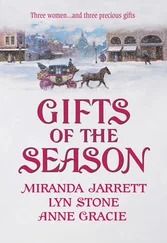Nuruddin Farah - Gifts
Здесь есть возможность читать онлайн «Nuruddin Farah - Gifts» весь текст электронной книги совершенно бесплатно (целиком полную версию без сокращений). В некоторых случаях можно слушать аудио, скачать через торрент в формате fb2 и присутствует краткое содержание. Год выпуска: 2011, Издательство: Arcade Publishing, Жанр: Современная проза, на английском языке. Описание произведения, (предисловие) а так же отзывы посетителей доступны на портале библиотеки ЛибКат.
- Название:Gifts
- Автор:
- Издательство:Arcade Publishing
- Жанр:
- Год:2011
- ISBN:нет данных
- Рейтинг книги:3 / 5. Голосов: 1
-
Избранное:Добавить в избранное
- Отзывы:
-
Ваша оценка:
- 60
- 1
- 2
- 3
- 4
- 5
Gifts: краткое содержание, описание и аннотация
Предлагаем к чтению аннотацию, описание, краткое содержание или предисловие (зависит от того, что написал сам автор книги «Gifts»). Если вы не нашли необходимую информацию о книге — напишите в комментариях, мы постараемся отыскать её.
Gifts — читать онлайн бесплатно полную книгу (весь текст) целиком
Ниже представлен текст книги, разбитый по страницам. Система сохранения места последней прочитанной страницы, позволяет с удобством читать онлайн бесплатно книгу «Gifts», без необходимости каждый раз заново искать на чём Вы остановились. Поставьте закладку, и сможете в любой момент перейти на страницу, на которой закончили чтение.
Интервал:
Закладка:
Duniya got to her feet, which were wobbly, once she caught her breath, after what amounted to the longest kiss, the most passionate one to date. Maybe, giddiness made her lose the sense of where she was, with whom or why Her head spun, her legs were not stable enough to support the weight of her swaying body and yet she was on cloud eleven, remembering no joy comparable to this. Had the long, passionate kissing dazed her so that she had taken hold of Bosaaso’s car keys as she scrambled to her feet, something of which she had been unaware? He was now saying to her, “And where are we driving off to, may I ask?”
“But I don’t even know how to drive!” she replied.
“In that case, I will teach you how to,” he said.
And she sobered up instantly.
She sat down away from him, recalling her conversation with Nasiiba who had offered to teach her to swim. Was she, Duniya, being prepared for a higher state of completeness, as it were, being taught to swim and to drive too? She pushed the car keys towards him.
As though in response to her unfriendly gesture, the heavens thundered threateningly, and a mad wind blew. Bosaaso rose to transfer the paraffin lamp from the place higher up in the tree to a spot much lower, out of the current of air. While looking up at him Duniya saw comets flying earthwards, falling, as the Somalis say, on jinns and non-Muslims. She gave a start when a bolt of lightning struck the skies, making her think of the three-thonged whip farmers crack to chase away birds feeding on their crops.
As he sat down beside her, he said, “What fireworks!”
“These are merely falling stars dropping on jinns: isn’t that what Muslims say?” she asked, taking hold of his outstretched hand and fondling it. She didn’t know what she was saying or why.
“The Koran informs us that these fiery comets are hurdled at nosey jinns eaves-dropping at the gates of heaven,” Bosaaso commented.
“Very naughty of them!” said Duniya.
When the heavens stopped thundering and the shooting-stars dropped no more, Duniya told herself that maybe the jinns, having become less inquisitive, had come down to earth and were whispering sweet nothings in her ears, which she touched on impulse.
“Is one of your ear-rings missing, or did you come out wearing only one?” he asked. “You couldn’t have lost it in the car?”
“My ear-rings?” And she felt her ear-lobes, one at a time. “I arrived wearing a pair of them,” she informed him, but made no move.
“I am certain I didn’t.”
He was immediately on his knees, searching for the missing earring by feel, in the half-dark, because he was sure she wouldn’t want him to bring down the paraffin lamp. The uneven roughness of the straw-mat pricked his palms. Nevertheless he remained undeterred even when she displayed little interest in recovering the missing item. “When do you think you lost it?” he asked.
She decided to frame the moment of their passion in her private memory, choosing not to speak of it lest she should devalue it. And yet she was definite the ear-ring had dropped then, a few moments prior to the instant when the heavens let go a fireworks of falling stars. “I can’t recall when,” she said.
He went nearer her. “I remember the shape of the ear-ring’s star, painted light blue, enclosed in an all-encompassing circle of silver.” He was so close to her she could hear his breathing, and could feel the warmth of his body. He took hold of her hand; she let him. “They were beautiful on you.”
She said nothing, because his head was moving upwards, towards her mouth, and their lips were preparing to encounter in a kiss of insane passion. She sensed a tremor running through her: what flames, she thought to herself. Supporting his weight, which was lighter than she had imagined, he returned again and again and again, asking for more and more. Finally she gave him a gentle push, saying, “Please do not rush me.”
He breathed loudly and explosively as if he had been under water for a long time and had just come back to the surface. He sat up, his face spreading with an understanding grin. She would have thought him coarse if he had spoken a single word of explanation or of apology. And both were glad when neither said anything.
She studied the shadow his head cast, a head tilting to the side. He sucked his lips in silence. Looking at the night outside, beyond the paraffin lamp’s moving shades, Duniya could see the silhouettes of lantern-carrying figures swinging in and out of her sight, like falling stars taking an eternity to reach the earth before exploding.
Silent, they watched an approaching, gyrating light. The footsteps of the waiter were followed by the noise of an idling diesel engine, probably the vehicle of a client being escorted to a tree-tent. Then they heard low voices, that of a man and a woman placing their orders. Then quiet.
Bosaaso said, “If it were my mother who had lost an ear-ring, she might have hummed a tune and danced a sad song about such a wasteful loss. If it were my Afro-American friend who had misplaced it, then the song and dance would have assumed a rhetorical dimension. And if it had been Yussur, she would have given a moan of regret, and would somehow have brought her mother into the talk, to blame her for it. But you? You say nothing, and show no worry in the world.”
A lantern came into view, and its carrier shouted a number from a decent distance. Since it wasn’t theirs, they ignored the waiter’s cry. When everything was quiet, she asked “What’s your Afro-American friend’s name?”
“Zawadi is her African name, Sarah her American given name.”
“Is Zawadi a Hausa name?”
“Swahili.”
“And how long did the two of you live together?”
He pondered for a long moment.
“You don’t have to answer if you do not want to.”
He shook his head vigorously. “It’s not that I don’t want to answer your question, it is that our living together had two phases, the first being simply flat-sharing, in that I was her tenant, then half a year or so later we began sharing more and more of the responsibilities of house-keeping and emotional aspects of our lives, including her two children.”
“What age were they?”
“They were much smaller then, of course, the girl eight, the boy six. This was thirteen years ago, when I first started working with a UN agency, based in New York, a year after taking my PhD.”
“And what work did she do?”
“She’s a community worker,” he said, pausing only to continue a second later. “You see, I don’t mind living by myself, but eating alone is something I cannot bear. As it happened I would cook larger portions and would invite the children to share the food with me, given that their mother would seldom come home to feed them. The children would play with the neighbourhood kids, and all I did was ask them to take a break, come and eat, and they would do so.”
Duniya was reminded of her own situation with Taariq, just before they married, with Taariq looking after her twins and her hospital assignments frequently keeping her out of the house. She was about to ask him if he had considered marrying her, when she saw a lantern approaching quietly. A waiter shouted their number, to which they responded simultaneously The tall waiter entered their acacia-tent with his head bent, smiling. He placed the food before Duniya, and pushed the bill, “which must be paid before consumption of item”, as he put it, in front of Bosaaso. Duniya insisted that they each settle half the bill, but Bosaaso wouldn’t hear of it, saying he was taking her out this evening, and requesting her not to spoil a pleasant night out by debating about petty sums such as these — after all, he had always accepted her generosities.
Читать дальшеИнтервал:
Закладка:
Похожие книги на «Gifts»
Представляем Вашему вниманию похожие книги на «Gifts» списком для выбора. Мы отобрали схожую по названию и смыслу литературу в надежде предоставить читателям больше вариантов отыскать новые, интересные, ещё непрочитанные произведения.
Обсуждение, отзывы о книге «Gifts» и просто собственные мнения читателей. Оставьте ваши комментарии, напишите, что Вы думаете о произведении, его смысле или главных героях. Укажите что конкретно понравилось, а что нет, и почему Вы так считаете.











